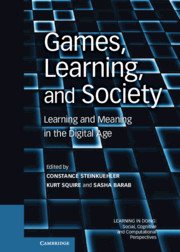Book contents
- Frontmatter
- Contents
- Contributors
- Series Foreword
- Foreword
- Acknowledgments
- Section I Games as Designed Experience
- 1 Introduction to Section I
- 2 Designed Cultures
- 3 Theme Is Not Meaning
- 4 Our Cheatin’ Hearts
- 5 Playing the Odds
- 6 Nurturing Lateral Leaps in Game Design
- 7 Uncharted 2: Among Thieves – How to Become a Hero
- 8 Interview with Harmonix
- 9 Yomi
- Section II Games as Emergent Culture
- Section III Games as Twenty-First-Century Curriculum
- Index
- References
6 - Nurturing Lateral Leaps in Game Design
Published online by Cambridge University Press: 05 August 2012
- Frontmatter
- Contents
- Contributors
- Series Foreword
- Foreword
- Acknowledgments
- Section I Games as Designed Experience
- 1 Introduction to Section I
- 2 Designed Cultures
- 3 Theme Is Not Meaning
- 4 Our Cheatin’ Hearts
- 5 Playing the Odds
- 6 Nurturing Lateral Leaps in Game Design
- 7 Uncharted 2: Among Thieves – How to Become a Hero
- 8 Interview with Harmonix
- 9 Yomi
- Section II Games as Emergent Culture
- Section III Games as Twenty-First-Century Curriculum
- Index
- References
Summary
SimCity
In 1984, Will Wright released his first game – a free-roaming shooting game called Raid on Bungeling Bay. As an unsurprising game in an established genre, Raid was an inauspicious start to a career that later included such innovative titles as The Sims and Spore. Yet Raid provided the backdrop for SimCity, the commercially successful and educationally fruitful game that established Wright as one of the most important game designers working today
In a 2009 interview, Wright recounted the design path he took to get from Raid on Bungeling Bay to SimCity:
Raid on Bungeling Bay was a super shoot ‘em up where you bomb these little islands. I had to create an editor where I could scroll around and create these little worlds to bomb. I found in playing with the editor that I was having a lot more fun creating these worlds than I was blowing them up. After I finished that game, I started kind of playing with the editor, and I started to add a little bit more dynamic to it. I wanted to keep traffic moving on the roads. I wanted to see kinds of dynamic systems operating. So I started reading about city planning. At first, I didn’t find the subject that interesting, but as I started developing very simple simulations of the theories I was reading, it became fascinating to me, because I had a little guinea pig city that I could sit there and experiment and play with.
In an additional interview, also taken from a Will Wright fan site, Wright describes how playing with the Raid editing utility evolved into designing it to be a game.
- Type
- Chapter
- Information
- Games, Learning, and SocietyLearning and Meaning in the Digital Age, pp. 49 - 74Publisher: Cambridge University PressPrint publication year: 2012

